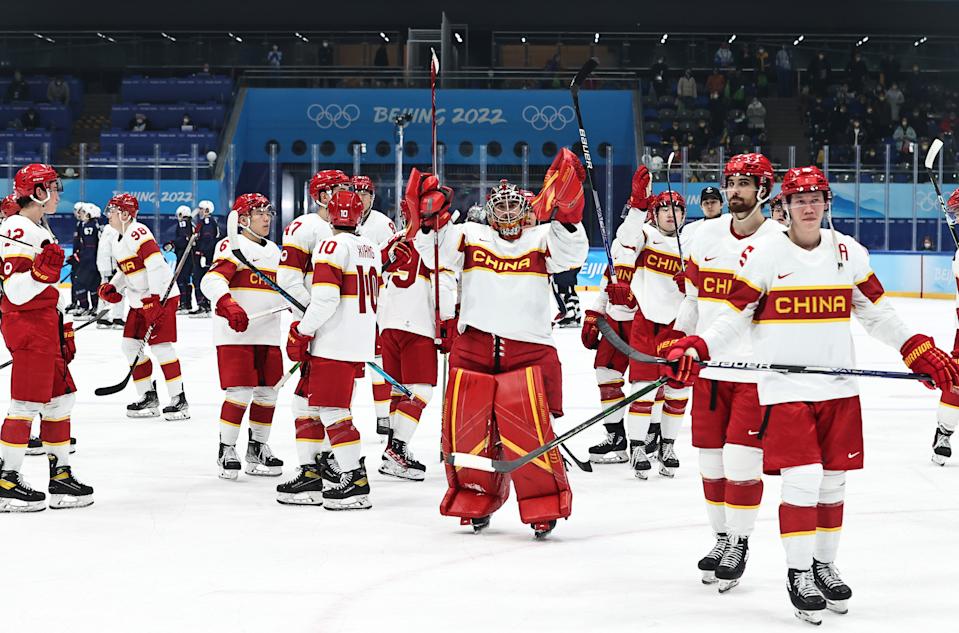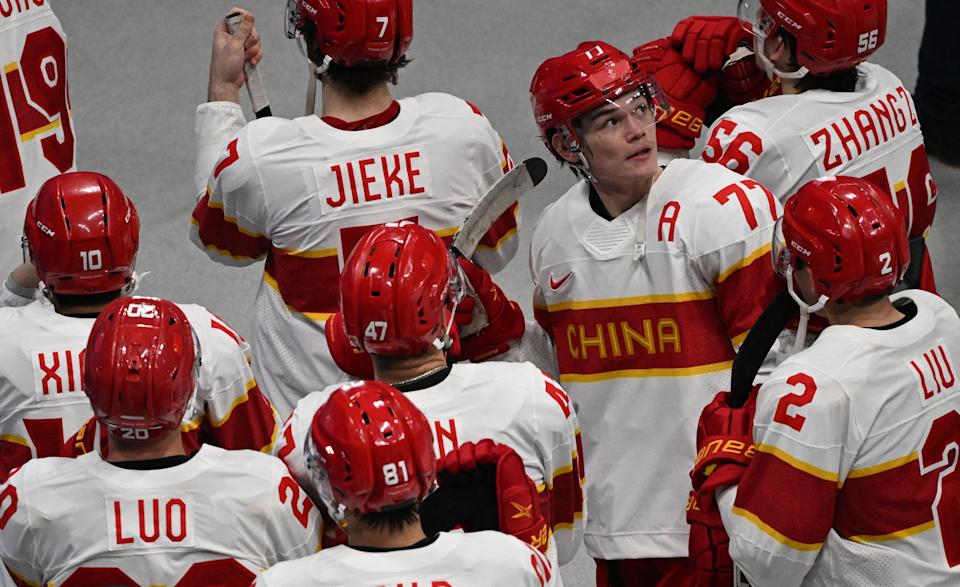BEIJING — “Captain China” was born in Vancouver, and his goaltender is from Michigan. Their teammates are the son of a U.S. Olympian, and guys named Kane and Schultz. They were almost disinvited from their own Olympics, spared embarrassment, but in the end, they made it, to the National Indoor Stadium on Thursday, to host Team USA.
They’re the most fascinating team at the Winter Games, a mishmash of mostly North American hockey players with adopted Chinese names. They represent a country that doesn’t allow dual citizenship, and a team that rarely speaks that country’s native tongue.
They played the first Olympic game in program history on Thursday, and got bludgeoned, 8-0, by a group of American collegians.
They’re a potential geopolitical lightning rod with little hope of hockey success here in Beijing, so you’d forgive them if, after Thursday night’s beatdown, they were regretting the ludicrous journey that brought them here — but no. They weren’t.
Instead, they were thrilled.
“It’s pretty surreal,” said that bearded Michigan-born goalie, Jeremy Smith. “And it’s pretty cool to put the Chinese sweater on.”
“It’s been a huge honor,” said Canadian Captain China, Brandon Yip.
“It was an amazing experience,” said Jake Chelios, son of Hockey Hall of Famer Chris. “Wearing this jersey for the first time was really special. And it was something I’ll remember the rest of my life.”
Did it compare to anything else he’d ever done?
“No,” he said with a scoff, and a laugh, and a grinning shake of his head.
And does he have a Chinese passport?
“Ah,” he said with another smile. “You gotta talk to the Chinese staff about that one.”


How foreigners ended up on Team China
They know that by now, you probably have all sorts of questions, about why Team China features white dudes with no familial connection to the motherland, so let’s rewind. Seven years ago, China won the right to host the 2022 Winter Olympics, and therefore the rite to qualify automatically in every sport. It wasn’t a rule. But it was tradition. The International Ice Hockey Federation later confirmed that China would indeed get one of 12 coveted spots in its men’s tournament.
And this was a problem. China had never entered a men’s hockey team in the Olympics before. It was ranked outside the world’s top 30. It had a few years to either develop a competitive team or recruit one.
So, a few years ago, Jake Chelios and others received similar phone calls.
“Ah, you wanna go play in China?” Chelios’ agent asked.
His initial reaction: What?
But then he and others across North American development leagues and second-tier pro leagues, some of them with Chinese grandparents, others with none, sought more details, and grew intrigued. Back in 2016, a wealthy Chinese businessman, Billy Ngok, had founded and bankrolled the Kunlun Red Star, a team based in Beijing and steeped in politics. It played in Russia’s KHL, the second-best hockey league in the world, and it groomed players for the Chinese national team. The Olympics weren’t the explicit goal, but they were part of the scheme, and clearly the carrot dangling from contract offers.
Dozens of players signed, and embarked on the greatest adventure of their hockey lives. They moved to China, then to the Moscow area when COVID-19 made Beijing-based participation in the KHL unfeasible. And behind the scenes, attorneys hashed out the thorniest aspect of the adventure: citizenship.


Eighteen of the 22 players who dressed for Thursday’s Olympic opener, including every member of the top two lines, were born and/or raised in the U.S. or Canada. They were, therefore, presumably not Chinese citizens. Olympic rules, however, require athletes to be nationals of the country they represent. And it’s unclear how, exactly, the Chinese government fulfilled this requirement.
Multiple players have indicated they were not asked to renounce their U.S. or Canadian citizenship. If so, either Chinese laws or Olympic rules were bent. Smith sidestepped the question Thursday, saying, “When I’m in China, I’m a Chinese. I’m supported by the Chinese, and I’m truly thankful for that. And when I go to America, I’m American.”
Several other North American players walked through the mixed zone and did not stop to answer questions. One, in declining an interview, said: “I don’t think we’re allowed to.”
Biggest problem facing Team China
The team is coached by an Italian-Canadian who runs practices and meetings in English. A few of the native Chinese require interpretation. Translators have been hired, and the few players who are fluent in both English and Mandarin also pitch in, but the language barrier exists. The years that players have spent together at Kunlun Red Star, and the bonds they’ve developed, help them overcome it.
And it’s clear, despite the odd optics, that many have embraced the chance to represent China. At the government’s request, on official rosters, each now goes by a Chinese name. Chelios is Kailiaosi Jieke. Smith is Shimisi Jieruimi. Cory Kane, from Irvine, California, is An Jian. Schultz is Enlai Zheng, and Yip, the captain, is Jinguang Ye. Each of them saluted the hundreds of fans who’d been allowed into the National Indoor Stadium on Thursday. Yip spoke about “making China proud.” They all feel that pride when they ride through Beijing on a Team China bus, and citizens start waving. “It’s electric,” Smith said.
Their problem has been that, six years after the project launched, the team still isn’t good.
They’re in last place in the KHL. And five months ago, with the Olympics approaching, IIHF president Luc Tardif openly considered pulling them from the tournament. China had been drawn in a group alongside the U.S. and Canada. NHL All-Stars loomed. “Watching a team being beaten 15-0 is not good for anyone, not for China, or for ice hockey,” Tardif said.
For months, officials deliberated. They even traveled to Russia to scout Red Star in person, and essentially assess their Olympic worthiness. The pandemic ultimately made their decision for them; NHL players pulled out, and fears of humiliation eased.
Thursday night was one-sided. But what was most important to the players that tugged on white-and-red sweaters was that it happened. That Chinese fans embraced them and cheered them on, even as the score became increasingly lopsided.
“I’m here to just inspire young Chinese hockey players, or even hockey players around the world,” Smith said. “It’s truly an honor.”
Back in the States, Chelios’ family felt similarly. Even his father, who once pulled on the Team USA jersey, was supporting Team China. Even despite all the geopolitical tension that looms over these Games.
“To see your family member in an Olympics,” Chelios said, “there’s nothing like it.”
